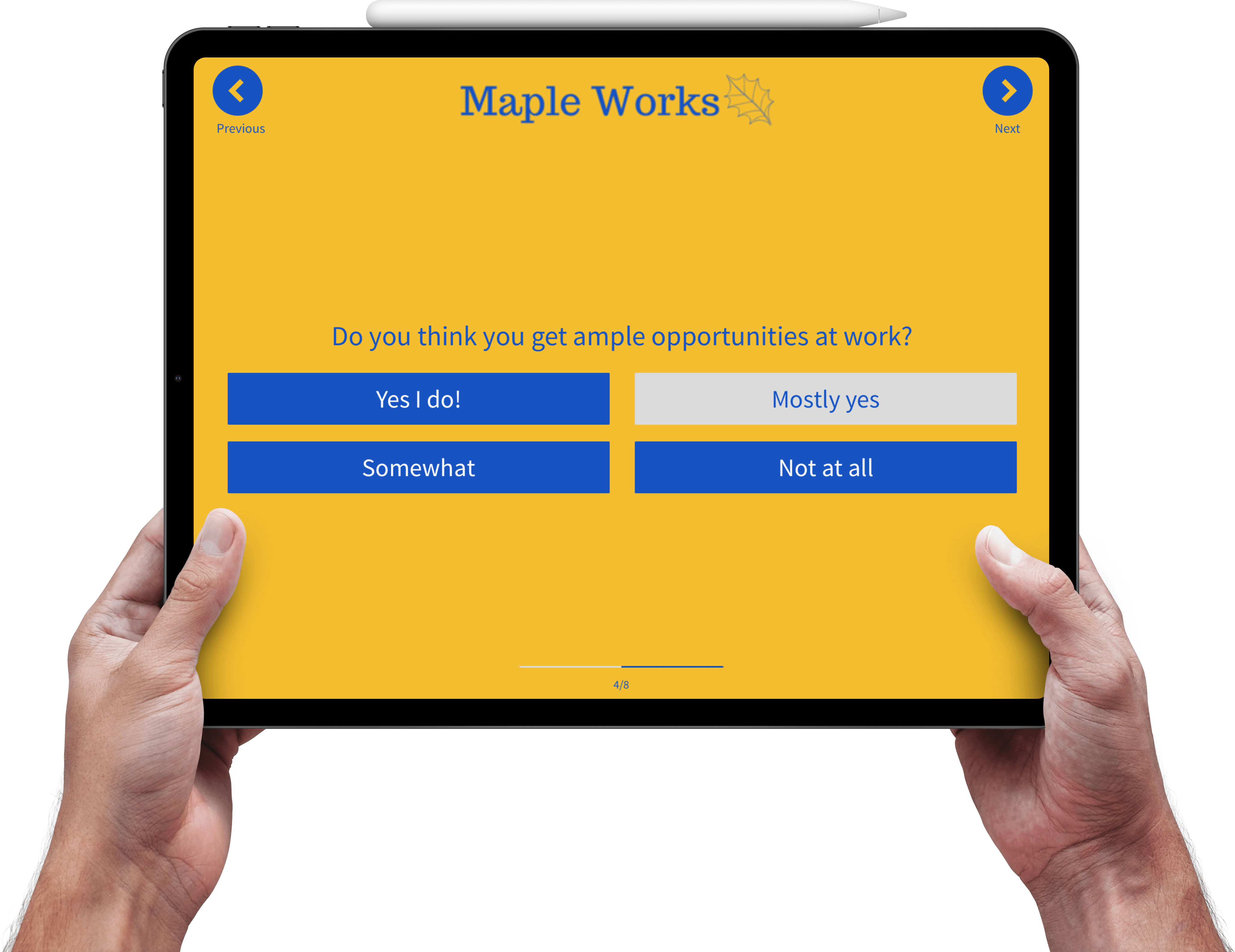Whether you are a small company or a large multinational, you probably already conduct employee surveys. When used properly, the benefits of employee surveys are great. They can help you understand what employees think of your organization.
About policies and procedures, managers and colleagues, job security and more. There are a number of different types of employee surveys to choose from. And thanks to survey apps and software, you can distill all this employee feedback into actionable, focused insight.
This insight can help you work on specific areas that improve the employee experience and increase employee satisfaction and engagement. And ultimately, create the kind of workforce that creates, innovates and takes your business to the top.
Employee Satisfaction Surveys
Employee satisfaction surveys measure exactly what the name suggests – how satisfied employees are with the job, the workplace, their manager, and the company. This is one of the most common types of employee surveys conducted. It serves as the first step towards creating a motivated workforce. Use this survey to measure basic factors responsible for satisfaction and contentment at the workplace. These factors directly influence employee retention and are relatively easier to correct.
Employee satisfaction surveys measure job satisfaction, working conditions, supervision and teamwork, and satisfaction with pay and benefits. They are also useful for understanding what your employees think of policies, diversity and inclusion, and job security.
They can include questions like:
Do you think your role is clearly defined in line with company objectives?
Does company X offer sufficient opportunities for promotions, career advancement?
Are you satisfied with your job?
Do you feel work is distributed evenly across your team?
Do your managers value your feedback?
And more
Employee Engagement Surveys
Employee engagement surveys are not the same as employee satisfaction surveys. Satisfied employees are not necessarily engaged employees. Engaged employees are enthusiastic, willing to take initiative and connect with the organization’s vision, mission, and overall goals. These employees are willing to go the extra mile for the organization.
An employee engagement survey measures the level of engagement, connection, and motivation employees feel with respect to their job, management, and the company. These surveys, when acted on properly, can help you get the best of your employees’ skills and talents. They encourage high performance and innovation from your employees. Engaged employees put in additional discretionary effort into their work.
They can include questions such as:
Do you feel valued at work?
How frequently do you receive recognition from your manager?
Can you see yourself working at company X in two years time?
Do you have access to learning and development at work?
Do you believe leadership gives you the autonomy to do your job?
And more
Boost Employee Engagement
Measure, analyze and improve employee feedback and reduce employee turnover with Zonka Feedback.

Culture Surveys
Organizational culture is the bedrock on which company policies, decisions, actions, and goals are based. Organizational culture is an ambiguous term, and what exactly makes an organization’s culture remains the subject of debate. However, everyone unanimously agrees that it exists and it plays a crucial role in defining behavior in organizations. Culture surveys are a great tool for discovering how employees see themselves and their role within the organization, their sense of ownership, accountability and more.
These employee surveys are especially important when companies go through culture changes like organizational restructuring, mergers, acquisitions and large changes in management. Culture surveys measure internal structures, skills and qualities that affect behavior, and management styles, expectations, power structures and more.
They usually include questions like:
Do you feel like your work is respected?
Do you like the atmosphere at company X?
Do you feel like you can trust management?
Do you feel like you are being listened to?
Do you think the company encourages a healthy work-life balance?
And more
Onboarding Surveys
These employee surveys are specifically designed to understand how new hires feel about the organization. They are a great way to check-in with new hires. They offer valuable information on new hires’ first impression of the organization. They can help you understand the new hire experience. You can use this survey to improve the onboarding experience and ensure new hire expectations match the company culture.
They can include questions such as:
Did you get accurate information about the organization during the recruitment process?
What steps do you think we can take to improve the recruitment process?
Do you feel welcomed at company X?
What steps do you think we can take to improve the onboarding process?
Were you provided a thorough orientation during your first week?
And more
Performance Appraisal Surveys
These surveys are a great way for managers and skip-managers to evaluate an employee’s performance. You can provide valuable feedback to your employees on improving performance. Properly conducted performance appraisal surveys can offer employees constructive criticism. These surveys engage both employees, and managers and supervisors. They, therefore, offer motivated employees a chance to gain valuable feedback on their work and can actually improve motivation.
These surveys usually include questions like:
For the employee:
To what extent did you meet your goals for the year?
How well do you prioritize and manage your workload?
For the manager:
Does this employee communicate effectively with others?
How would you rate employee Y’s leadership ability?
How well does employee Y set and meet deadlines?
How would you rate the quality of employee Y’s work?
And more
Professional Development Surveys
These employee surveys are extremely important, yet often overlooked. Highly engaged and motivated employees want opportunities to develop professionally over the course of their career. Relevant and challenging professional development opportunities can actually engage and motivate employees further. This, in turn, can fuel a cycle of increased employee engagement.
High-potential employees don't just want to be promoted. They also want to learn new skills and perspectives. Professional development can include skills and industry training, leadership test & training, and executive grooming. You can also give your employees the opportunity to work in different departments or job roles. It can include retreats and networking events across the organization. You can also provide opportunities to interact with professionals across the industry through trade shows, events. Some companies also provide their employees the autonomy to work on pet projects, further fueling creativity, interest, and engagement among employees.
Professional development surveys can help you assess what you are doing right and what you are doing wrong when it comes to your employees’ development and growth. The results of these surveys can help you create an engaged and skilled workforce.
These surveys usually include questions like:
Does company X provide opportunities for professional development?
How often do you get access to industry- and skill-related training?
Does your manager encourage you to develop yourself professionally?
Does company X provide a clear path for growth and development?
And more
Exit Surveys
You could have a great company culture, offer incredible perks, provide autonomy to high-functioning employees. Yet, some of your employees will still leave. The loss of a valuable employee can be tough. But an exit survey does offer you an opportunity to learn more about the employee’s perspective and experience at your organization. Exit surveys can help you capture honest employee feedback about your workplace policies, work culture and more.
You can act on this feedback to identify trends and patterns that result in employees leaving. You can improve your retention strategies and reduce employee turnover. Exit surveys include questions like:
What prompted you to start looking for a new job?
Under what circumstances would you consider returning to the company?
Do you think management adequately recognized your contributions to the job?
What did you like about your job here?
What can the organization improve on?
And more
Employee surveys are a great way to understand your employees better. Survey apps and software can help you analyze all that information you collect from surveys. From trend analyses to comprehensive reports – get actionable insight that corresponds to specific areas of your business outcomes. Check out Zonka’s employee survey templates and the comprehensive app-based and online feedback management software.
Learn more about the Employee Surveys
- 5 Employee Lifecycle Surveys to Fuel HR Improvements
- Five Creative Employee Surveys You Probably Aren’t Using But Really Should
- Employee Surveys and Feedback - why does your organization need them?
- Employee Engagement Survey Questions to Translate Engagement into Employee Performance
Boost Employee Engagement
Measure, analyze and improve employee feedback and reduce employee turnover with Zonka Feedback.












